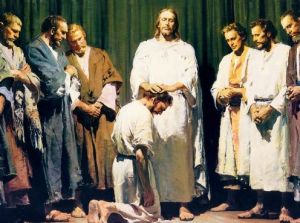 The U.S. state of Michigan may be the site of yet another challenge to ordination rights. Current state law lacks specific language on what standards wedding officiants must meet to perform a legal wedding ceremony, but this may change with the continued growth of online churches such as the Universal Life Church Monastery. As usual, though, the argument against online ordination falls short of tenable, revealing a number of major weaknesses.
The U.S. state of Michigan may be the site of yet another challenge to ordination rights. Current state law lacks specific language on what standards wedding officiants must meet to perform a legal wedding ceremony, but this may change with the continued growth of online churches such as the Universal Life Church Monastery. As usual, though, the argument against online ordination falls short of tenable, revealing a number of major weaknesses.
Michigan state representative David Agema fears the practice with ruin the institution of marriage. "I would be willing to put in a little legislation," Agema said according to WOOD TV, "not much, but a little, to see that it's done the appropriate way that it has for [the two thousand] years it's been done." This is a favorite argument of conservatives, but also a logical fallacy known as argumentum ad antiquitatem_._ This fallacy states that a thing is right just because it is traditional, but this is not necessarily so--it is right because it works. Online ordination works for people. Hence, Agema's contention that online ordination is wrong is invalid.
But opposition to online ordination also poses a threat to religious freedom. The First Amendment to the United States Constitution protects the free exercise of religion, while the Religious Freedom Restoration Act of 1993 attempts to preserve this freedom. The U.S. government may not determine what is and what is not a religion, or whether a religion can ordain ministers according to its doctrines and tenets, since doing so restricts the religious liberties of one group while favoring those of another. Thus, when politicians like Agema attempt to curtail ordination rights, they threaten to restrict constitutionally protected freedoms.
 The reason online ordination should be restricted, opponents believe, is that it devalues marriage. Agema told WOOD TV that online ordination "cheapens marriage," while ordained pastor Scott Hoezee, of Calvin College, said it feels "insulting that someone could gain the same title that most people gain after six or seven years of post-high school education." But is this fair? Conventional ministers spend years in seminary school only to end up marrying complete strangers with whom they have no personal connection, and who sometimes barely know each other. People get ordained online, however, to marry friend and family precisely because they know and love them, and many of these couples have been engaged for years but are denied formal recognition by other churches despite their commitment. So, who is really cheapening marriage?
The reason online ordination should be restricted, opponents believe, is that it devalues marriage. Agema told WOOD TV that online ordination "cheapens marriage," while ordained pastor Scott Hoezee, of Calvin College, said it feels "insulting that someone could gain the same title that most people gain after six or seven years of post-high school education." But is this fair? Conventional ministers spend years in seminary school only to end up marrying complete strangers with whom they have no personal connection, and who sometimes barely know each other. People get ordained online, however, to marry friend and family precisely because they know and love them, and many of these couples have been engaged for years but are denied formal recognition by other churches despite their commitment. So, who is really cheapening marriage?
Conservative clerics and lawmakers in Michigan think they have a rock-solid argument against online ordination, but it begins to fall apart upon closer inspection. Appealing to tradition is not a legitimate argument, opposition to online ordination threatens religious liberties, and weddings performed by ministers ordained online show just as much respect and honor for the institution of marriage as do those performed by conventional ministers. There is a good point to be made about weeding out the jokesters through formal licensing (we can't defend religious freedom without defining what religious freedom is), but we must take great care to ensure we do not overstep our bounds in defining legitimate religious ritual.
Source:
WOOD TV


0 comments